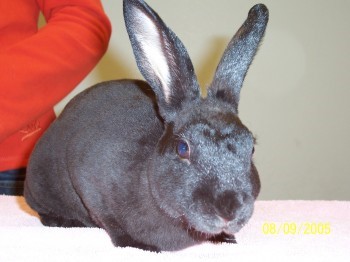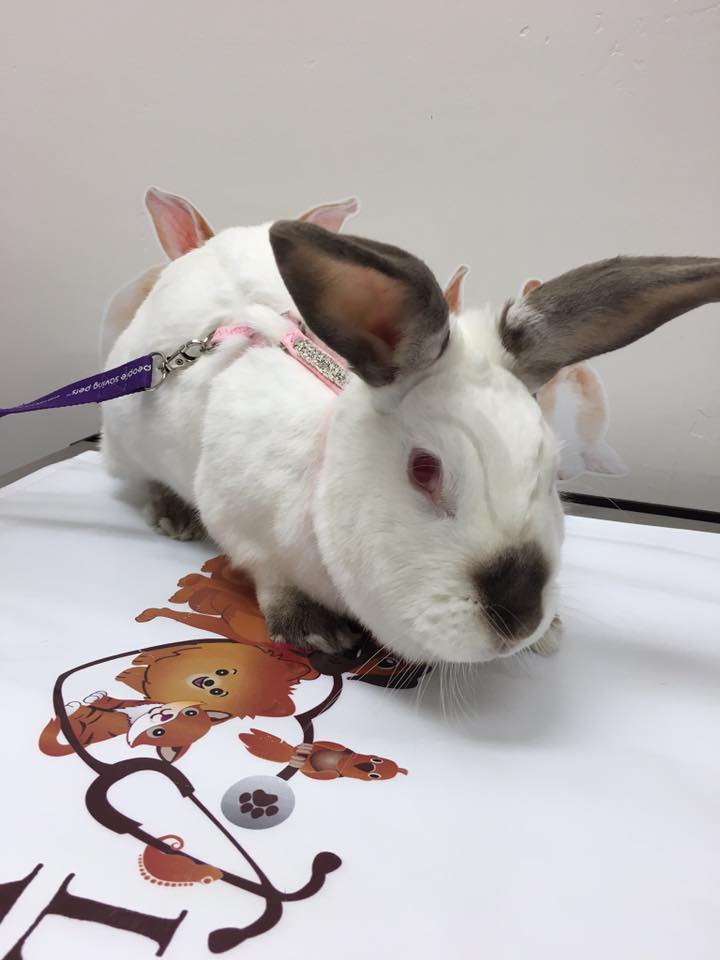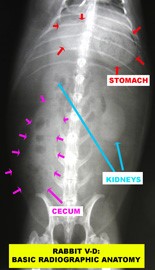Little Critters Veterinary Hospital
1525 N Gilbert Road Suite #C-101Gilbert, AZ 85234(480)696-7744
www.littlecrittersvet.com
Rabbit Diet and their Gastrointestinal Anatomy

PROPER DIET:
|

|
Rabbis have a very sensitive gastrointestinal (GI) tract and many disease problems are associated with a poor diet causing GI dysfunction. The very best thing you can do for your rabbit is to have grass hay available at all time. Notice I said “grass” hay and not alfalfa hay. Alfalfa is much to rich for rabbits and very high in calcium which can result in urinary problems. The best types of hay are grass, either Bermuda or timothy. Hay is an excellent source of fiber and not only helps to keep their GI tract working normally, but also provides them with fiber for chewing activity and tooth wear. In addition to hay, offer at least 1cup/5 lbs. body weight of leafy greens daily. Spring greens are often a good choice and can be purchased prepackaged. Greens such as the tops of most veggies, parsley, kale and collards are good choices. Iceberg lettuce is not a good food because it offers no nutritional value. Lastly, grass hay based pellets can be provided at about 1/4cup / 5 lbs. body weight daily. Pellets should not be the sole diet and should not be used in place of hay. Foods to avoid are the grain and sugar rich foods. These can result in obesity or diarrhea.
|
Summary:
- Grass Hay should be the primary food source – bermuda / timothy- Mixed Leafy greens should be provided daily- Pellets are not the primary diet and should be grass hay based – Alfalfa is not a good hay source for rabbits– Rabbits should not be fed food rich in grains and sugars– Multiple diseases are related to the diet
- Read about hay in the diet and various types HERE
GASTROINTESTINAL TRACT:
|
Based on the above information you may have gotten the idea that GI health is a big issue in rabbits and you're correct. I often think of rabbits as little horses that can colic and have GI problems at the drop of a hat. The best way to treat GI problems is to avoid it by feeding the correct diet. Some of the more common problems include diarrhea, anorexia and gut stasis/lack of fecal production. If any of these problems are noted, your bunny must be examined by a veterinarian who will direct the treatment based on your specific pet’s disease problems. An issue that I’ve seen occasionally occurs when an owner is concerned about potential diarrhea, but upon examination of the rabbit it is producing normal feces. With a through history we find that these rabbits are only producing a soft fecal pellet once daily and all else is normal. This is the best GI problem to have because it is normal. Rabbits produce a special type of feces that is only partially digested and stored in their cecum. About once daily they will pass this large soft pellet and eat it. The ingestion of this cecaltroph is a natural way of recycling B Vitamins and nutrients and is normal for bunnies. Some pet rabbits fed a rich diet will fail to consume their cecaltroph and owners often are concerned that this is diarrhea. It is not. True diarrhea is the abnormal consistency of all feces produced and will often cause fecal staining around the rectum and on the tail. This is a medical problem that should be addressed, cecaltrophy is not. Also, if your rabbit fails to eat the cecaltroph it will not cause any harm.
|

|
The failure to eat (anorexia) and/or the failure to produce feces is a serious and potentially life threatening problem and all rabbits showing these signs should be examined by a veterinarian. Generally speaking the rabbits are treated with fluids, high fiber diet, medications to increase GI movement and pain medications. However, treatment will vary depending upon the primary cause of the illness. Home care often involves making a pellet slurry and syringe feeding several times daily until the rabbit eats voluntarily.
|
Summary:
- GI disease is a serious problem in rabbits
- Signs of GI disease are decreased appetite and fecal production (small feces or no feces)
- GI disease is often due to a poor diet
- Cecaltrophy is normal in rabbits
- The best rabbit diets are high in grass hay and leafy greens
- All rabbits with GI signs should be examined by a veterinarian
- Home care often involves syringe feeding until eating on their own
|

|
|
|